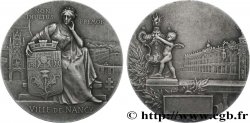fme_370973 - III REPUBLIC Médaille coloniale
недоступный.
Товар уже продан в нашем интернет-магазине (2017)
Цена: : 60.00 €
Товар уже продан в нашем интернет-магазине (2017)
Цена: : 60.00 €
Тип Médaille coloniale
Дата: 1893
Монетный двор / Город: France Colonies
Металл: silver plated bronze
Диаметр: 30 mm
Ориентация осей монеты: 12 h.
Вес: 13,85 g.
Век: lisse
Комментарии о состоянии
Bel aspect général pour cette médaille à l’usure prononcée et anciennement nettoyée
Лицевая сторона
Аверс: легенда: RÉPUBLIQUE FRANÇAISE.
Аверс: описание: Buste casqué et cuirassé de la République à gauche ; le casque orné d’une branche de lauriers.
Обратная сторона
Реверс: легенда: MÉDAILLE COLONIALE.
Реверс: Описание: Globe terrestre posé devant une ancre avec trophée d’armes et de drapeaux en arrière plan.
Комментарий
La médaille coloniale est une décoration française créée par l'article 75 de la loi de finances du 26 juillet 1893 pour récompenser « les services militaires dans les colonies, résultants de la participation à des opérations de guerre, dans une colonie ou un pays de protectorat ». Elle n'est plus décernée. Un décret du 6 juin 1962 a modifié l'appellation « coloniale » pour l'appellation « outre-mer ».
Instituée par l'article 75 de la loi de finances du 26 juillet 18931, le décret d’application, en date du 6 mars 18942, énumère les opérations militaires menées par la France dans ses colonies ou protectorats (Algérie - Maroc - Cochinchine - Côte d'Or – Îles Marquises – Nossi-Bé – Nouvelle-Calédonie – Sénégal et Soudan – Îles de la Société – Tunisie) ouvrant droit à cette décoration. Le champ d’application du décret a un large effet rétroactif, puisque les premières opérations prises en compte pour l’attribution de la Médaille coloniale remontent à 1827, soit au tout début de la conquête de l'Algérie. Elle est systématiquement attribuée avec une agrafe rappelant le territoire de l'opération militaire..
The Colonial Medal is a French decoration created by Article 75 of the Finance Act of July 26, 1893 to reward \\\"military services in the colonies, resulting from participation in war operations, in a colony or a protectorate country.\\\" It is no longer awarded. A decree of June 6, 1962 changed the designation \\\"colonial\\\" to the designation \\\"overseas.\\\" Established by Article 75 of the Finance Act of July 26, 18931, the implementing decree, dated March 6, 18942, lists the military operations conducted by France in its colonies or protectorates (Algeria - Morocco - Cochinchina - Côte d'Or - Marquesas Islands - Nossi-Bé - New Caledonia - Senegal and Sudan - Society Islands - Tunisia) giving entitlement to this decoration. The scope of the decree has a broad retroactive effect, since the first operations taken into account for the award of the Colonial Medal date back to 1827, at the very beginning of the conquest of Algeria. It is systematically awarded with a clasp recalling the territory of the military operation.
Instituée par l'article 75 de la loi de finances du 26 juillet 18931, le décret d’application, en date du 6 mars 18942, énumère les opérations militaires menées par la France dans ses colonies ou protectorats (Algérie - Maroc - Cochinchine - Côte d'Or – Îles Marquises – Nossi-Bé – Nouvelle-Calédonie – Sénégal et Soudan – Îles de la Société – Tunisie) ouvrant droit à cette décoration. Le champ d’application du décret a un large effet rétroactif, puisque les premières opérations prises en compte pour l’attribution de la Médaille coloniale remontent à 1827, soit au tout début de la conquête de l'Algérie. Elle est systématiquement attribuée avec une agrafe rappelant le territoire de l'opération militaire..
The Colonial Medal is a French decoration created by Article 75 of the Finance Act of July 26, 1893 to reward \\\"military services in the colonies, resulting from participation in war operations, in a colony or a protectorate country.\\\" It is no longer awarded. A decree of June 6, 1962 changed the designation \\\"colonial\\\" to the designation \\\"overseas.\\\" Established by Article 75 of the Finance Act of July 26, 18931, the implementing decree, dated March 6, 18942, lists the military operations conducted by France in its colonies or protectorates (Algeria - Morocco - Cochinchina - Côte d'Or - Marquesas Islands - Nossi-Bé - New Caledonia - Senegal and Sudan - Society Islands - Tunisia) giving entitlement to this decoration. The scope of the decree has a broad retroactive effect, since the first operations taken into account for the award of the Colonial Medal date back to 1827, at the very beginning of the conquest of Algeria. It is systematically awarded with a clasp recalling the territory of the military operation.








 Cообщить об ошибке
Cообщить об ошибке Распечатать страницу
Распечатать страницу Отправить мой выбор
Отправить мой выбор Задать вопрос
Задать вопрос Consign / sell
Consign / sell
 Информация
Информация












